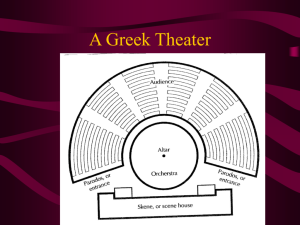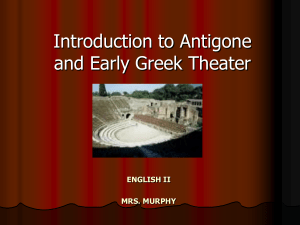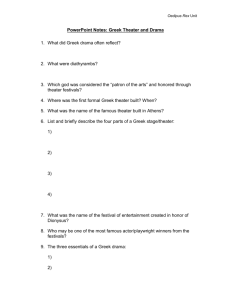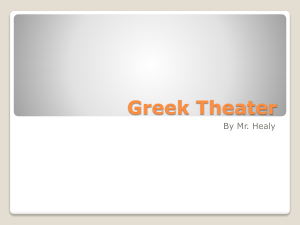Introduction to Greek Theatre
advertisement
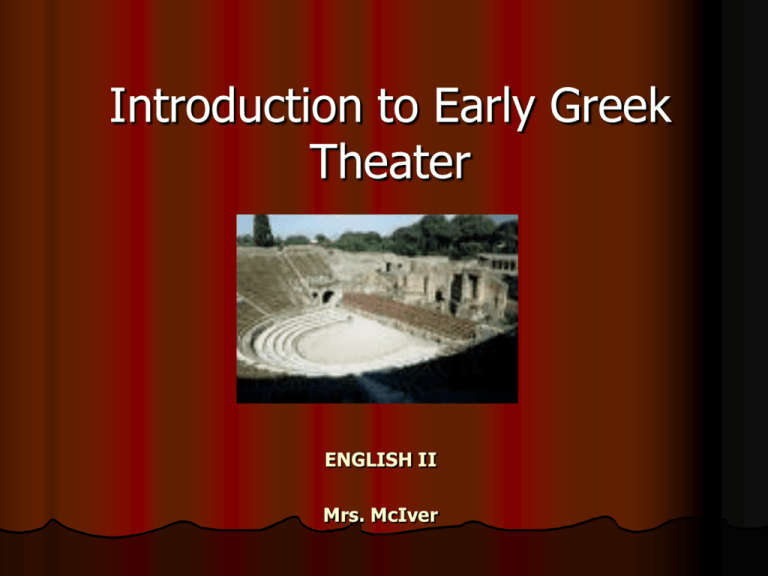
Introduction to Early Greek Theater ENGLISH II Mrs. McIver Origins of Drama Drama began during the sixth century, B.C. as part of a religious festival that was intended to honor the god Dionysus, the god of wine, agriculture, and fertility. These festivals were held annually in March and followed certain rituals, or patterns. Festival goers spent an entire week drinking wine, praising fertility, and worshiping the phallus. The early Greeks also spent much time singing chants (while very drunk) in order to praise Dionysus. Origins of Drama Continued While drunk and singing these songs of praise, worshipers also danced around an altar. This group of people were called a chorus. Eventually a man named Thespis began to write down these songs and revised them so that they would tell a story. After a while Thespis decided to have one member of the chorus step away from the others to play the part of a hero or god. He wore a special mask and began talking to the chorus. This was the first character. Continuing Changes in Drama The modern theater we know today has his origins in Greek drama as well. A man named Aeschylus decided to add a second character to the performance. The second character allowed conflict to be shown on the stage. Now that conflict was able to be seen on stage, drama as we know it was born. What were early Greek plays about? When many think of ancient Greece, they imagine white pillars and elaborately dressed gods and goddesses in a calm and serene setting. The early Greek plays were anything but calm and dealt with topics such as war, murder, lust, and betrayal. These early plays were also either a tragedy or a comedy. The First Greek Theaters The first theaters were all outdoors and were called amphitheaters. Greek Theatre was similar to an outdoor stadium that could hold between 15,000 – 20,000 people. Seats were carved out of stone on a hillside. The stage area was at the bottom and was where the chorus members sang and danced around an altar. Parts of a Greek Theater The earliest Greek theaters had four major parts: Orchestra—the circular area of the theater where the actors would sing and dance Theatron—where attendees would sit to view the action Parados—a long narrow passageway that actors used to make entrances and exits Skene—a building located behind the stage that was designed to look like a temple, palace or other structure needed. It served as a prop and also allowed actors to make entrances and exits Greek Theater Greek Theater Greek Theater Costumes and Props in Early Greek Drama Actors in these early plays did not rely on elaborate costumes to tell the characters apart. Instead they used huge masks to distinguish between characters. Using masks also allowed actors to play more than one role. The only costume change involved was adding a new mask. The masks had very large mouthpieces that amplified the sound of the actors’ voices, and often had large eye openings as well. (Remember no microphones were available during this time.) These masks usually represented familiar characters that would be easily recognized by the audience. Greek Masks Colors were used in the masks as well to convey emotion. Most were some shade of red since there were made of terra cotta. Wigs were also frequently added to help distinguish between characters. Today the symbol of the mask has come to symbolize theater worldwide. Examples of Greek Masks Greek Theater Special Effects There were no curtains, intermissions, lights, or microphones. Consequently, all scenes took place in daylight settings, all scene changes had to be built into the actor’s dialogue, and the chorus and actors had to have strong voices. Deus ex machina (meaning: “god from the machine”) = type of crane used for suspending figures who portrayed gods. Eccyclema = moveable or revolving platform. Greek Theater Special Effects Deus ex Machina Examples Eccyclema Examples Eccyclema coming through center doors Eccyclema Blueprint The Actors The Greek name for an actor was “hypocrite.” As there were only three actors, they wore masks to play multiple parts. It was quick and easy to change the masks that distinguished characters. All actors were men, because it was considered undignified for women to appear on stage Actors wore padded costumes, wigs, and high-heeled boots to make them taller and give them added dignity and power which added to the grandeur of the spectacle. Actors had to be able to speak in poetic language and sing using a loud and clear voice. The Chorus Between scenes, while the actors changed their costumes and masks, there was a chorus that entertained the audience. Accompanied by an orchestra, the chorus and consisted of singers and dancers who moved and sang together in unison, acting as one character. This part of the play is called the Choral Ode. Originally, they Chorus started out with 50 people, but Sophocles fixed the number at 15. The leader of the chorus is called the choragus and participated in the dialogue with actors during scenes. The Chorus The Chorus The playwright used the chorus and their songs to: Add the beauty of song and dance. Set the mood or express the main themes of the play by commenting on the action. Create a connection between the actors and the audience. Converse with and give advice to the actors. Tell about events that have already happened in the past. Foretell the future by interpreting the actions of the actors. The Stories Originally, the stories were hymns and prayers honoring the gods, especially Dionysus. Over time, the content of the stories changed to legends of Greek leaders and heroes. Tragedy A tragedy is a drama that recounts the downfall of a dignified, superior character who is involved in historically or socially significant events. This stems from the Greek belief that man was subject to the whims of the gods and fate. The root of Greek tragedy is that man cannot avoid suffering. In nearly all tragedies, man’s biggest fault is excessive pride – a mistaken belief that he could somehow avoid fate or the will of the gods. Greek Tragic Hero The Greek tragic hero had to be a man or woman capable of great suffering. The tragic hero possesses a defect or tragic flaw, that contributes to his or her downfall. This flaw may be poor judgment, pride, weakness, or an excess of an admirable quality. The tragic hero recognizes his or her tragic flaw and its consequences, but only after it is too late to change the course of events. Hubris and Purpose of Greek Tragedy Hubris is defined as excessive pride. Hubris leaves leads to suffering and then to an understanding (catharsis) of man’s place in the system of life. Catharsis is an emotional release caused by an intense emotional experience. The purpose of a Greek tragedy is to learn a lesson through the catastrophes that befall the characters on stage and to understand that their misfortunes are a result of not following the will of the Gods or trying to avoid their own destinies because of hubris. Burial Rites The Greeks believed that a person must be buried or his/her soul would wander the earth in unrest. SOPHOCLES Who is this guy? Sophocles wrote the Greek Tragedy Antigone. This is the play will read during this unit. SOPHOCLES Sophocles was born in Colonus, Greece in 497 BCE He died in 406 BCE at approximately 90 years of age. He Lived during the Golden Age of Greece (The Golden Age of Greece was from approximately 800 BCE to 300 BCE) He was a successful musician, athlete, and respected playwright. He was also active in social and political life. He held several priesthoods, was imperial treasurer in 443 BCE, and a general in 440 BCE Sophocles as a Playwright In the drama festivals of his day, Sophocles won the first place prize for best play 24 times! He wrote more than a hundred plays but only seven remain. The most famous of his plays are: Oedipus the King, Oedipus at Colonus, Antigone, and Electra. Sophocles’ Impact on Drama Sophocles expanded the format of drama by adding a third actor. He increased the amount of dialogue within a play. He decreased the importance of the chorus by fixing its number at 15. He invented painted scenery and added flute music in the background of his plays. He made each play of a trilogy stand by itself as a separate story. Assignment Time Today we discussed the origins of Greek drama, and we learned that the actors relied on masks to help the audience distinguish between characters in the play. Assignment: 1. Think about if you were a character. Create a mask that represents your personality. Think about how you could make this mask uniquely represent you. 2. After your mask is complete, write a paragraph that explains why your mask uniquely represents you as a character. What character traits does it show? Explain your choices.

